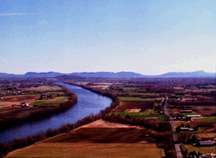Pocomtuc

The Pocumtuc (v. Pocomtuck) or Deerfield Indians were a prominent Native American tribe originally inhabiting western areas of what is now Massachusetts, especially around the confluence of the Deerfield and Connecticut Rivers in today's Franklin County. Their territory also included much of current-day Hampden and Hampshire Counties, plus areas now in northern Connecticut and southern Vermont. Their principal village, also known as Pocumtuck, was in the vicinity of the present day village of Deerfield.[1] Their language, now extinct, was an R-dialect of the Algonquian language family, most likely related to the Wappinger and nearby Mahican tribes of the Hudson River Valley.[2]
Little is known about the Pocumtuck people, but it is believed they led a lifestyle similar to other tribes of New England. They would have engaged in semi-sedentary agriculture of maize, beans, and squash. They also hunted game and fished in the Connecticut River, which served as a major inland transportation route. The Pocumtuck were decimated by intertribal warfare with the powerful Mohawk, then based in present-day New York, and by smallpox epidemics after European contact. They had no immunity to the new disease and suffered high fatalities. In addition, they lost tribal members due to taking part in wars among the Dutch, English, French, and their respective Native American allies.[3]
The Pocumtuck were originally allied with the Tunxis and Narragansett against Chief Uncas of the Mohegan and the Pequot. All these tribes united against the English colonists with the Wampanoag Confederacy in King Philip's War.[2]
At the close of the war, many Pocumtuck, Nipmuc, and other tribes fled to Schaghticoke, a village on the Hudson River. They remained there until the outbreak of the Seven Years' War in 1754, when most joined and merged into the Abenaki tribes at Saint-François-du-Lac, Quebec or moved further west.[4] Small bands remained in Massachusetts as late as the 19th century, but most fled north or lost their tribal identity through intermarriage with other tribes and settlers. Many of the present-day Abenaki of New Hampshire, Vermont, and Canada are of part-Pocumtuck ancestry.
Among the members of the Pocumtuck tribe was Chief Wawanotewat, better known as "Greylock." A famous warrior, he continued to lead bands into Massachusetts after most of his followers had left the state. Mount Greylock in the Berkshires is named after him.[5]
Villages associated with the Pocumtuck
- Agawam - present-day Metro Center Springfield, Massachusetts. The adjacent, present-day city of Agawam, Massachusetts is named after this village (sometimes associated with the Nipmuc)
- Mayawaug - present-day West Suffield, Connecticut
- Nameroke - present-day Enfield, Connecticut
- Nonotuck - present-day Northampton, Massachusetts
- Norwottuck - present-day Hadley, Massachusetts
- Pachasock - present-day Westfield, Massachusetts / West Springfield, Massachusetts
- Peskeompscut - present-day Turners Falls, Massachusetts
- Pocumtuck - present-day Deerfield, Massachusetts
- Scitico - present-day Enfield, Connecticut (farther east)
- Squakeag - present-day Northfield, Massachusetts (sometimes associated with the Nipmuc)
- Woronoco or Waranoak - present-day Russell, Massachusetts or colonial Westfield, Massachusetts[6][7]
References
- ↑ Hodge, Frederick W. Handbook of North American Indians. Washington, DC.: Government Printing Press, 1910.
- 1 2 Swanton, John R. The Indian Tribes of North America, pp. 23-24. Smithsonian Institution Bureau of American Ethnology Bulletin 145. Washington DC.: Government Printing Office, 1952.
- ↑ Thomas, Peter A. In the Maelstrom of Change: the Indian Trade and Cultural Process in the Middle Connecticut River Valley: 1635–1665. Ph.D. dissertation, Department of Anthropology, University of Massachusetts—Amherst, 1979
- ↑ Spady, James O'Neil. "As if in a Great Darkness: Native American Refugees of the Middle Connecticut River Valley in the Aftermath of King Philip's War: 1677-1697," Historical Journal of Massachusetts, Vol. 23, no. 2 (Summer, 1995), 183-197.
- ↑ Pocumtuck
- ↑ De Forrest, John W. "History of the Indians of Connecticut from the Earliest Known Period to 1850", Connecticut Historical Society, 1852, p. 219.
- ↑ Tercentenary Commission of the State of Connecticut, "Tercentenary Pamphlet Series". Committee on Historical Publications, 1933, p. 27.